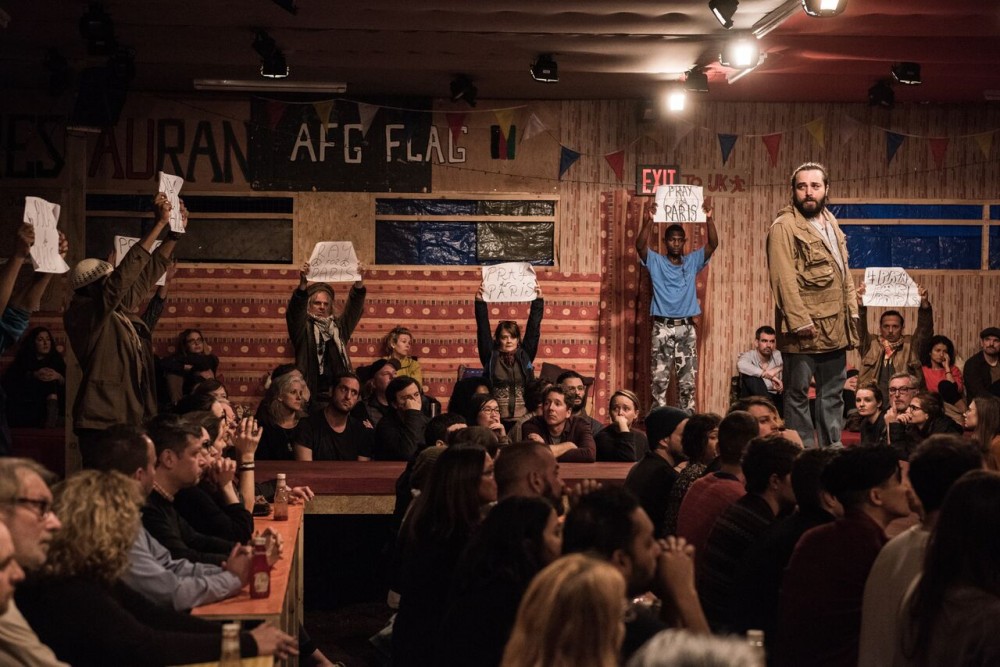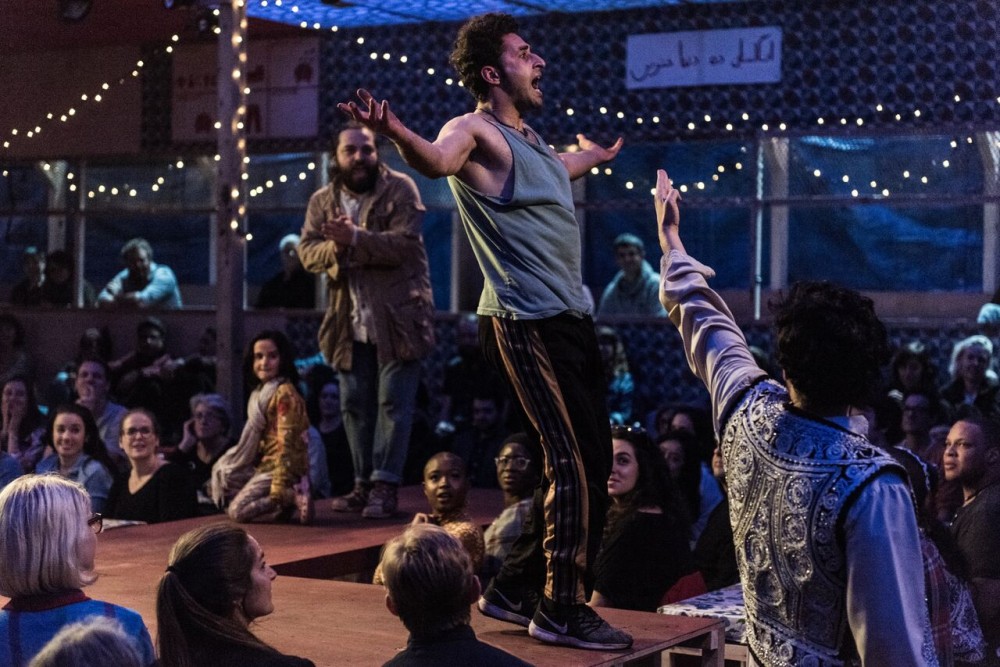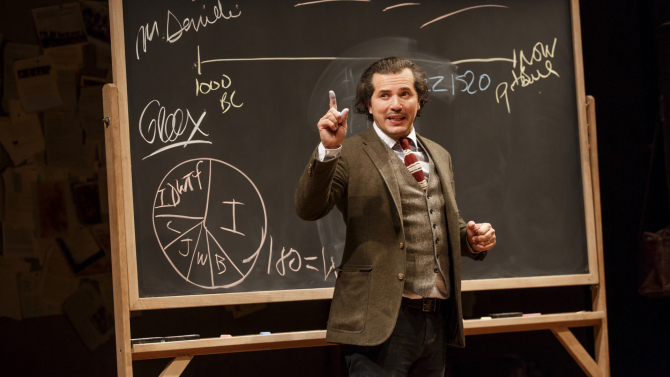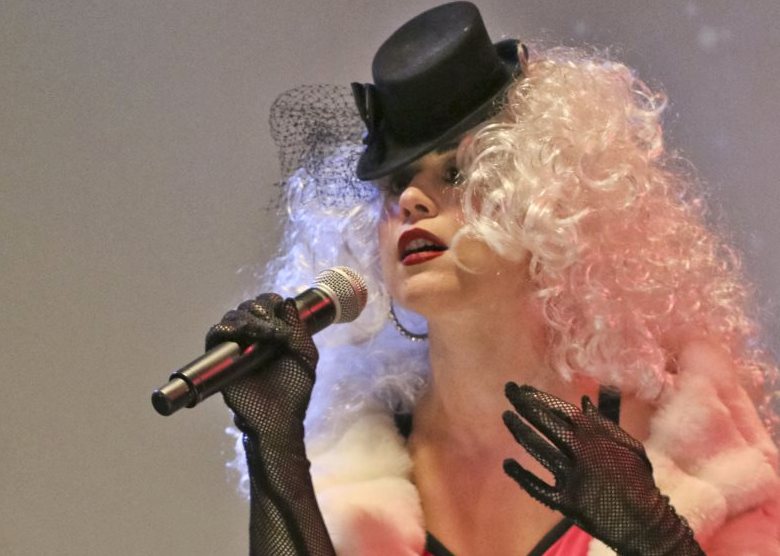by Carol Rocamora
“When does a place become a home?”
It’s a profound question asked by one of the survivors of the refugee camp in Calais, founded in 2015. They fled from oppression in thousands – from Iran, Eritrea, Syria, Afghanistan, Kurdistan, Pakhistan, Palestine, Sudan, Somalia. They walked, they swam, they piled into trunks of cars and lorries, and eventually found themselves in a kind of purgatory – the Calais camp in the north of France. Packed into rickety tents or sleeping in the ditches within its fences, they could gaze across the English Channel and see the white cliffs of Dover only 22 miles away – a vision of asylum and the new life they dreamed of.
It’s hard to believe – but it happened – that a tented theatre arose from the muddy fields of the camp. It’s called Good Chance, organized by two British volunteers, both named Joe (Murphy and Robertson). Together with a troupe of refugees, they composed a true-to-life account of their life in the camp. It’s called The Jungle. Their production miraculously crossed the channel to the UK, where it was produced by the Young Vic in London. Overcoming the even greater obstacle of American immigration laws, this courageous company is now telling its story at St. Ann’s Warehouse in Brooklyn.
Designer Miriam Buether has transformed St. Ann’s interior into a facsimile of the camp itself – with cardboard walls, tents, hand-made signs, makeshift beds, rickety kitchens, and the clutter of its everyday life. Audience members sit on benches, while fifteen “residents” of the camp scurry across raised aisles between the rows, serving tea, telling their stories. There are sounds of airplanes flying overhead and traffic whizzing by (the camp is located by a French freeway). TV cameras on surrounding walls show live footage of life in the camp, while actors dramatize it before us. It’s a unique immersive theatre experience – designed to help us understand, if we can, what it feels like to sacrifice homeland, family, jobs – indeed, identity itself – in search of a new home.
The miracle of The Jungle is that it’s not a song of despair, but rather of hope – passionate, unswerving hope. Slowly, from the chaos, characters emerge. There’s Safi from Syria (played by Ammar Haj Ahmad), a former student of English literature, who narrates the story. There’s Salar (Ben Turner) who starts an Afghan restaurant in the camp with Norullah (Mohammad Amiri). There’s Okot (John Pfumojena), a 17-year-old Sudanese boy who arrives in the camp beaten and bleeding. There are several brave activists from the UK – including Sam (an Eton graduate, played by Alex Lawther), who organizes the building of 800 “houses” (“if the governments won’t do it, do it yourself!”), and Paula (Jo McInnes), who is determined to save the camp’s children.
Before our eyes, we see the creation of a new, makeshift “state” with a “government” of its own – a blend of ten nationalities and languages living together with a common purpose of survival. Together, they withstand oppression, forced eviction, relocation, and violation of human rights by the French police. It’s a remarkable vision of what might be, if only we could learn to live together. The passionate ensemble of multi-national actors – men, women, and children, costumed by Catherine Kodicek – is directed by Stephen Daldry and Justin Martin.
“A refugee dies many times,” says Okot. This heartrending story has no ending. Norullah is killed on the motorway. But Okot is saved by Beth (Rachel Redford), who pays smugglers $1000 of her own money to get him to the UK. Safi, our narrator, is also smuggled into England, awaiting asylum in Leicester. The journey continues for so many today . . .
“We’re all refugees,” says a Brit from Newcastle, who questions the meaning of identity on a profound, universal level. Meanwhile, we leave the theatre with “UK! UK! UK” – the ensemble’s chant of hope – still ringing in our ears.
Photos: Teddy Wolff
The Jungle, by Joe Murphy and Joe Robertson, directed by Stephen Daldry and Justin Martin, at St. Ann’s Warehouse, Brooklyn through January 27
St.Ann’s Warehouse, 45 Water Street, Brooklyn, NY

























